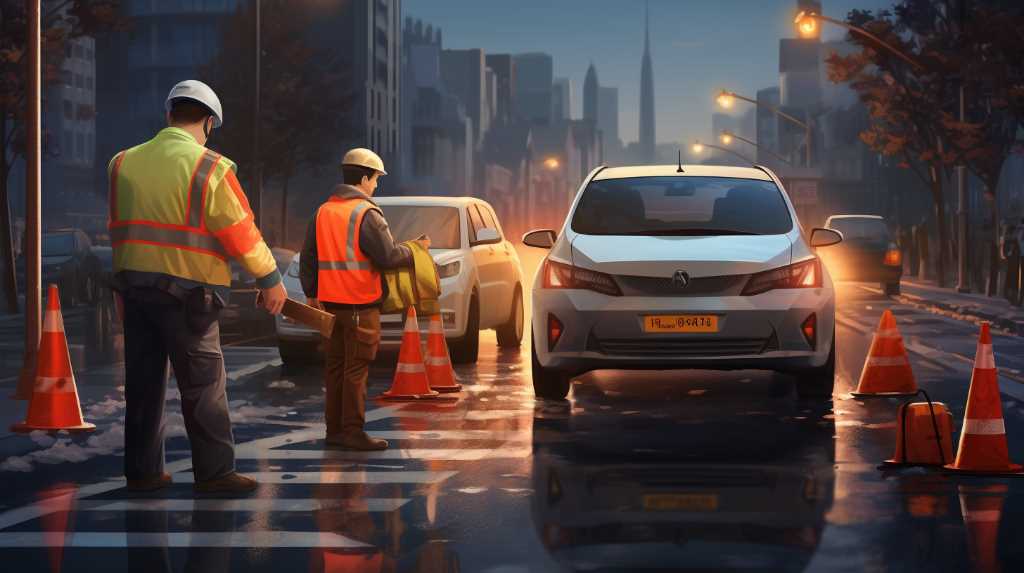
If you’re in a car accident, it’s important to stay calm and do things step by step, which can help everyone involved.
First, make sure you and others are safe. Check for any injuries and get to a safe place if you need to.
Then, swap important details with the other driver, like how to contact each other and your insurance info. It’s really helpful later on to take pictures of the accident and write down what happened.
You should tell the police and your insurance company about the accident right away.
After you’ve done the first things, don’t forget to see a doctor and maybe get advice from a lawyer to handle what comes next in a smart way.
Remember, this advice is general, and you might need to adjust your actions based on the specific situation.
Always prioritize safety and follow legal requirements for reporting accidents in your area.
Assessing Immediate Dangers
Upon exiting the vehicle post-collision, it is imperative to swiftly evaluate the presence of any potential hazards such as leaking fuel, fires, or oncoming traffic.
The moments following an accident are critical; therefore, ensuring your immediate safety takes precedence. If you detect a strong odor of gasoline or see flames, it is crucial to distance yourself and others from the vehicle to mitigate the risk of an explosion.
Moreover, be acutely aware of the flow of traffic around the accident scene to avoid secondary collisions. Enacting a safe perimeter and signaling to oncoming vehicles can prevent further incidents.
Your ability to act decisively and responsibly can not only safeguard your well-being but also that of your fellow motorists.
Exchanging Essential Information
After making sure everyone is safe following a car accident, it’s very important to swap your contact details and insurance information with everyone involved. Doing this helps protect your rights and makes it easier to deal with insurance claims later. You should get the full names, addresses, phone numbers, and insurance details, like policy numbers, from each person. Don’t forget to also write down the type of car each person was driving and their license plate numbers.
Even if the accident seems small, always exchange this information to avoid problems later. Be friendly but be careful not to say it was your fault or anything that might be used against you in the future. Just focus on getting the facts right. This isn’t just a good habit; it’s something you’re entitled and expected to do. Make sure you have all the information you need to confidently handle the next steps.
Documenting the Accident Scene
After you’ve swapped details, it’s really important to make a detailed record of the car crash. This helps with any insurance or legal issues later on.
Start by taking pictures from different sides to show all cars, their places, any damage you can see, tire marks, the state of the road, and traffic signs or lights.
Write down the time, date, and what the weather was like. If there are people who saw what happened, try to get their names and ways to contact them because what they say can really help.
Draw a simple map of the crash, showing which way the cars were going and where they hit each other.
Doing this step carefully can make a big difference when it comes to insurance or legal stuff. Paying close attention now can help make sure things are sorted out fairly later on.
Reporting the Incident
If you’re in a car crash, it’s important to call the police right away. When you do this, the police make an official report, which is really important for dealing with insurance and staying protected legally. The police will come to the crash site, talk to everyone involved, and write a report that tells exactly what happened.
By calling the police quickly, you show that you’re handling the situation responsibly, and this can help things go more smoothly later on.
You should also know that in some places, if you don’t report a crash, you could get in trouble with the law and face fines. So, it’s important to call the police right away to look after your own interests and to make sure you’re following the law. It’s not just a good idea to report an accident — in many cases, it’s something you have to do by law.
Following Up Post-Accident
Initiating contact with your insurance company is a crucial step in the post-accident process to ensure coverage of damages and liabilities. Promptly after an accident, inform your insurer of the incident to begin the claims process. Provide them with all pertinent information and documentation, including the accident report, photographs, and witness statements, if available.
It’s imperative to understand your insurance policy’s terms and the extent of your coverage. Maintain open communication with your insurance adjuster and respond to their inquiries accurately and timely. Keep a record of all correspondence, including dates and summaries of conversations.
Should disputes arise, consider seeking legal advice to protect your rights and interests. Vigilant follow-up is essential to secure the benefits you’re entitled to after an accident.
Conclusion
After a car crash, it’s important to stay calm and follow some key steps to make sure you’re safe, following the law, and protecting your rights.
First, check for any immediate dangers like fires or traffic.
Then, swap important details with the other driver, like insurance information.
Take photos and notes about the accident scene to have a record of what happened.
Don’t forget to let the police know about the crash; this can help you later on.
Being careful to do these things can make dealing with the aftermath of an accident less stressful and help you avoid extra problems.
It’s a good idea to keep these tips in mind if you ever find yourself in this situation.